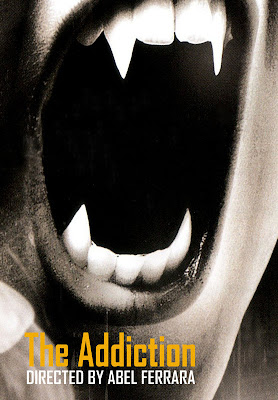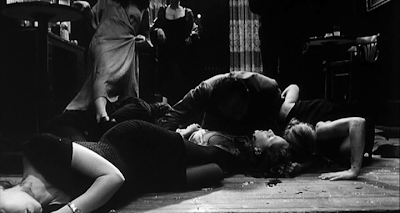Wednesday, May 22, 2013
The Addiction
With his undoubtedly most idiosyncratic and inaccessible celluloid work The Addiction (1995), NYC Catholic nihilist auteur Abel Ferrara (9 Lives of a Wet Pussy, King of New York) managed to homogenize Gothic Grit with wayward wit in an innately anomalous vampire flick that has the ability to scare viewers away from doing drugs and studying philosophy. The virtual sister film to Ferrara’s The Funeral (1996) in that both films were apparently inspired by the tragic death of screenwriter Nicholas St. John's son, The Addiction is a decidedly dreary and maliciously melancholy work that mischievously mediates on sex, death, drugs, and religion to the point of inspiring abject disgust and misanthropy in the viewer. An aberrant arthouse bloodsucker flick shot in suavely stylized black-and-white, The Addiction is much like the David Lynch produced work Nadja (1994) directed by Michael Almereyda in its total deconstruction of the vampire subgenre, except with a vulgar and seemingly oxymoronic rap soundtrack (which was probably inspired by the fact that Russell Simmons of all people executive produced the film) as opposed to soothing shoegaze and all the more philosophically penetrating, like a dispiriting stake in the heart of Occidental philosophy. Starring the ever so homely and unappealing Lili Taylor (Arizona Dream, Pecker)—an actress who is only second to Sandra Bernhard in terms of being an anti-diva who literally brings physical disgust to my stomach any time I see her—The Addiction follows an ugly graduate philosophy student who does ugly things after being bitten by a beauteous babe of the unhinged and undead sort. Addicted to blood and books, as well as searching for the meaning of life, death, and the reason for man’s eternal violence against his fellow man, the physically and mentally perturbed plasma-addict vampire of The Addiction goes through an odyssey of the body and soul that cannot simply be learned by spending one’s free time reading in an academic library. Featuring quotes and references to Friedrich Nietzsche, Søren Kierkegaard, Jean-Paul Sartre, Edmund Husserl, Martin Heidegger, Ludwig Feuerbach, Descartes, Dante, Charles Baudelaire, and William S. Burroughs, as well as stock footage from the atrocities of Auschwitz concentration camp and the My Lai Massacre, The Addiction is a mystifying and misery-inspiring piece of allegorical celluloid metaphysics that reminds one that, to quote Christopher Walken’s character’s seemingly contrived but charming reference of Nietzsche, “Mankind is driven to exist beyond good and evil…From the beginning.” While I never saw Abel Ferrara as a man interested in German philosophy and arthouse vampire flicks, The Addiction is filled with enough drug-addled derangement, cultural pessimism, and an unromantic view of NYC to remind viewers who directed it, even if the philosophical meat of the film was clearly a result of screenwriter Nicholas St. John's uncompromising contribution to this seedy exercise in post-Victorian bloodlust.
Kathleen Conklin (Lili Taylor) is a promising yet hopelessly naive graduate student at the philosophy department of New York University, but she has a hard time understanding why a bunch of American soldiers wasted a bunch of gooks at Vietnam and an even harder time fathoming why only one fellow was brought to justice for his infamous war crimes. It is only when she is passively bitten by a voluptuous vamp named Casanova (Annabella Sciorra) during a nefarious NYC night that Kathleen begins to understand the meaning of a life of lechery and bloodlust, later learning from an elder vampire played by Christopher Walken, that “The entire world's a graveyard, and we, the birds of prey picking at the bones. That's all we are. We're the ones who let the dying know the hour has come.” While Casanova even tells Kathleen to “order me to go away” before she sinks her teeth into her neck, the grad student is far too pathetically lifeless and intellectually pedantic to merely verbally defend herself, even at the request of her victimizer (who calls her a “collaborator” due to her pathetic passivity in an unholy crime against her soul), thus her transformation into a bloodlusting vampire is just what she needed, at least when it comes to being a cannibal as opposed to mincemeat in the rotten Big Apple. Unfortunately, being addicted to human hemoglobin, Kathleen must satisfy her cravings by abandoning empathy and stoically taking victims, including her best friend Jean (Edie Falco), pompous philosophy professor and a Negro gangster named “Black” (played by rapper Fredro Starr) who rather vulgarly offers her a bit of “jungle fever,” who provides her with some tasty dark meat. When a pretentious anthropology student quotes Protagoras’ famous and once-infamous proto-humanist “man is the measure of all things,” Kathleen teaches the sucker of a idealistic college student man’s true worth by draining her of her sacred sanguine fluid. When the anthropology student freaks out over the fact a piece of flesh has been ripped out of her neck, Kathleen snidely remarks, “It was your decision. Your friend Feuerbach wrote that all men counting stars are equivalent in every way to God. My indifference is not the concern here. It's your astonishment that needs studying,” thus displaying her new and improved intellectual insights as a postmodern active-nihilist philosopher with a master morality as opposed to a slave morality (like she once had before as a feeble human). Of course, being a fiending blood addict, Kathleen suffers major withdraws when not getting enough of the biological fluids she needs and an older and wiser Nietzschean vampire named Peina (Christopher Walken) recommends that she read trust-fund junky William S. Burroughs' Naked Lunch (1959) to help her cope with addiction. A recovering vampire addict who only need to take a ‘maintenance dose’ of blood to survive, Peina is proud to admit to Kathleen that he is a rare bloodsucker that defecates and that he lives a rather 'human existence' and that she has all of her immortal lifetime to master her diseased soul. A studious sadist of the vampiric sort, Kathleen graduates and has a party to celebrate and admits to her professor and colleges, “I'd like to share a little bit of what I've learned,” thereupon ushering in an ominous yet orgasmic bloodsucker orgy with her vampire compatriots (including Casanova and her many victims, who are now vampires as well). Being a bloodthirsty broad who must spread moral decay and a daunting degenerative disease of the immortal sort to survive, Kathleen inevitably comes to the conclusion that suicide is the only answer, but her maker, Casanova—an unlikely fan of Calvinist theologian/philosopher R. C. Sproul—is not going to let her philosophical progeny make the mistake of an endless lifetime. In the end, Kathleen sheds her human mortality, which is really a small price to pay to be perennially undead in at a time when god is dead.
A rare vampire flick lacking in romance (as well as a romantic subplot), aristocratic elegance, and an easy-to-read black-and-white moral compass, The Addiction is more focused on the need to live an egoless, colorless, and nondualist life as depicted through the torturous trials and tribulations of a vamp that is initially too interested in social prestige and hemoglobin to see the bigger picture, but finally comes around when her overwhelming bloodlust almost destroys her. Indeed, it is no surprise that the film concludes with Kathleen walking by her own tombstone, which has the inscription John 11:25 as one witnesses the vampiress’ death, burial, resurrection, and post-resurrection. Of course, with its quoting of everyone from Nietzsche to a Calvinist kook, one would be quite wrong to describe The Addiction as a ‘Christian’ film, but more like a work of Perennialism as promoted by Aldous Huxley due to its portrayal of all religions sharing a singular truth, thus ultimately making the film a strangely spiritual work with a positive message, which is rather ironic for a work featuring vulgar academic-eating vampire orgies, historical snuff footage, cliche Nietzschean ramblings, and a rather retarded rap soundtrack. For a film featuring a curious character whose aberrant actions are more disturbing than real-life footage of genocide and war, The Addiction must be doing something right as an unwonted bloodsucker and soul-sucking flick that trades in supernatural superstition and folklore for perennial philosophy and gritty street realism of the quasi-apocalyptic. In comparison to similarly themed works like Jeffrey Arsenault‘s Night Owl (1993) and Larry Fessenden’s The Habit (1995), The Addiction is certainly the king of American metropolitan metaphysical vampire flicks. With a short but brilliantly bittersweet performance from Christopher Walken that is almost in league with German actor Max Schreck in Nosferatu: A Symphony of Horror (1922) directed by F.W. Murnau in terms of vampiric authenticity, as well as shadowy and phantasmagorical imagery in the spirit of the German expressionist movement except contained with a largely “black” and negrophilic world, The Addiction is a rare postmodern ‘horror’ flick that does not inspire me to barf, even though it features a ghastly ghoul of a gal like Lili Taylor in the leading role, which is typically a cruel curse for any celluloid work. One of the few Americans films ever made—be it from the horror genre or otherwise—with some intellectual meat to it, which makes it all the more diacritic and inaccessible since it is a quasi-horror flick of sorts, The Addiction is undoubtedly habit-forming, although Lili Taylor and Feuerbach certainly leave a bad taste in one's mouth.
-Ty E
By
soil
at
May 22, 2013
![]()
Subscribe to:
Post Comments (Atom)
Soiled Sinema 2007 - 2013. All rights reserved. Best viewed in Firefox and Chrome.











If only Robin Williams had been in that pile of dead bodys we wouldn`t have had to put up with the bastard for the last 63 years ! ! !.
ReplyDeleteCheers my old mate, i knew you`d start to see the light sooner or later, ALL WOOFTERS MUST BE ANNIHILATED ! ! !.
ReplyDeleteWouldn`t it be marvellous if British pansy queer filth like Elton John, Ian McKellen, Clive Barker, and Rupert Everett could all snuff themselves out to. The bloody dirty filthy disgusting Limey faggot fairy woofter scum-of-the-earth dog-shit garbage. Just imagine, those four contemptible and hideous poofs gone on the same day, total perfection.
ReplyDelete